|
|
Post by nautonnier on Feb 19, 2018 11:18:05 GMT
|
|
|
|
Post by missouriboy on Feb 19, 2018 14:17:46 GMT
Quite true. But if science is largely about the elimination of possibilities, then certain wiggle relationships defy elimination more aggressively than others ... thus being worthy of closer, more detailed analysis. "Coincidentally' {cough}, each city is also run by the Democrat party"  |
|
|
|
Post by missouriboy on Apr 12, 2018 13:22:57 GMT
|
|
|
|
Post by Ratty on Apr 13, 2018 0:11:31 GMT
I have not heard the words "tipping point" for quite a while. All in all, a thoroughly disheartening article. More razor blades required ......  |
|
|
|
Post by glennkoks on Apr 19, 2018 3:38:44 GMT
Horrible news just in. The Gulf Stream is weaker than any time in the last 1600 years. Which is going to lead to… You guessed it frigid Euro temps. inhabitat.com/the-gulf-stream-is-the-weakest-it-has-been-in-at-least-1600-years-heres-why-thats-really-bad-news/And it has been attributed to our use of fossil fuels. So we burn fossil fuels, melt Greenland and the warming causes us to get colder. So I personally recommend that we do not burn fossil fuels and get colder, so we don't get warmer and melt Greenland which will make us freeze to death. But then again if we don't get warmer and melt Greenland and freeze to death we may freeze to death because we are not warming anymore. Or something like that… Does this make sense? |
|
|
|
Post by Ratty on Apr 19, 2018 4:39:06 GMT
Horrible news just in. The Gulf Stream is weaker than any time in the last 1600 years. Which is going to lead to… You guessed it frigid Euro temps. inhabitat.com/the-gulf-stream-is-the-weakest-it-has-been-in-at-least-1600-years-heres-why-thats-really-bad-news/And it has been attributed to our use of fossil fuels. So we burn fossil fuels, melt Greenland and the warming causes us to get colder. So I personally recommend that we do not burn fossil fuels and get colder, so we don't get warmer and melt Greenland which will make us freeze to death. But then again if we don't get warmer and melt Greenland and freeze to death we may freeze to death because we are not warming anymore. Or something like that… Does this make sense?  |
|
|
|
Post by acidohm on Apr 19, 2018 4:56:44 GMT
Horrible news just in. The Gulf Stream is weaker than any time in the last 1600 years. Which is going to lead to… You guessed it frigid Euro temps. inhabitat.com/the-gulf-stream-is-the-weakest-it-has-been-in-at-least-1600-years-heres-why-thats-really-bad-news/And it has been attributed to our use of fossil fuels. So we burn fossil fuels, melt Greenland and the warming causes us to get colder. So I personally recommend that we do not burn fossil fuels and get colder, so we don't get warmer and melt Greenland which will make us freeze to death. But then again if we don't get warmer and melt Greenland and freeze to death we may freeze to death because we are not warming anymore. Or something like that… Does this make sense? You should write a paper Glenn! Do forget to add the bit about greenland getting so warm, it's got cold and gained ice mass, which only happens when it gets really warm so it's worse then we thought 😲😲 |
|
|
|
Post by Ratty on Apr 19, 2018 5:24:51 GMT
Horrible news just in. The Gulf Stream is weaker than any time in the last 1600 years. Which is going to lead to… You guessed it frigid Euro temps. inhabitat.com/the-gulf-stream-is-the-weakest-it-has-been-in-at-least-1600-years-heres-why-thats-really-bad-news/And it has been attributed to our use of fossil fuels. So we burn fossil fuels, melt Greenland and the warming causes us to get colder. So I personally recommend that we do not burn fossil fuels and get colder, so we don't get warmer and melt Greenland which will make us freeze to death. But then again if we don't get warmer and melt Greenland and freeze to death we may freeze to death because we are not warming anymore. Or something like that… Does this make sense? You should write a paper Glenn! Do forget to add the bit about greenland getting so warm, it's got cold and gained ice mass, which only happens when it gets really warm so it's worse then we thought 😲😲 ?  |
|
|
|
Post by acidohm on Jun 26, 2018 18:54:51 GMT
fido.nrk.no/4cf750c3e0b034153d6ea12a898156b4a030f739896889be4a11b4526a97a663/Nature-climate-change.pdfif we can take this paper as an example of a cause of North Atlantic ocean cooling, ie, Greenland meltwater runoff.....is it therefore falsified by existing cooling during a period where the Greenland Icecap would be frozen?? nsidc.org/greenland-today/Not currently melting.... However, as previously pointed out by Missouriboy.....strong, cold labrador current... Another source of freshwater to the Lab current is Hudson Bay... The total area of the Hudson Bay drainage is about 3.8 million km2 and the mean discharge of all the rivers flowing into it is 30 900 m3/s. Something like 1/3 of all freshwater discharged into the arctic circle, comes from Hudson bay. www.thecanadianencyclopedia.ca/en/article/hudson-bay/So, (correct me as soon as i go wrong....) that would be 974,462,400 km3 of water per year?? This to be honest seems alot? Compared to 239 cubic kilometers (57 cu mi) per year melt water from greenland... en.wikipedia.org/wiki/Greenland_ice_sheetMaybe, maybe not........now data on what has been happening upstream of the hudson bay is hard to find....has there been increased preciptation for example?? However i seem to remember that a new icebreaker has been called for to keep shipping lanes open in the Hudson bay?? Has it got colder there?? Good figures Acidohm ... and since I don't have any discharge figures for the Labrador Current (Vague memory of a chart somewhere?) I cannot prove that increases in the Lab are doing the damage. However, I have temperature and salinity values at the interface (~38-40N, 42-50W) that show cross-sectional cold water displacement very large in 2010-11 ... and lesser but >norm in 2007-8 and 2014-15. So ... what do we know. We know the North Atlantic above 40N is getting increasingly colder since about 2010 and particularly since 2014. Heat wise, we know that we probably have three, maybe four, factors accounting for the declining temperature. 1) We have a small outflow at depth (~0.15C) due to overturning ... 2) We have loss to atmosphere of unknown quantity ... 3) We have inflow of colder water from further north (combination northern drainages, Arctic Ocean , Greenland melt and other) ... and 4) We have possible recycle of cold discharge coming down the Lab Pike and getting recirculated(What goes around comes around). AND YOU ARE RIGHT ... seems a lot in comparison to melt ... BUT IT'S ALL COLD UP THERE ... right??? Greenland may be overplayed. But it still appears to be playing Hell in Gulf Stream Land. I'll post those 38-40 cross sections here shortly. Keep up the good work. And I don't know about Drs. Doom and Gloom (Bumper and Thumper). They do what they do. Nope, Nautonnier was right....Missouri proposed the strong lab current 🤣🤣 |
|
|
|
Post by nautonnier on Jun 30, 2018 0:07:31 GMT
Nice Graphic showing the surface currents/temperatures from spaghettimodels.com It does appear that the Labrador current is displacing the North Atlantic Drift/Northern Gulf Stream Eastward and its northern drift is being attenuated. 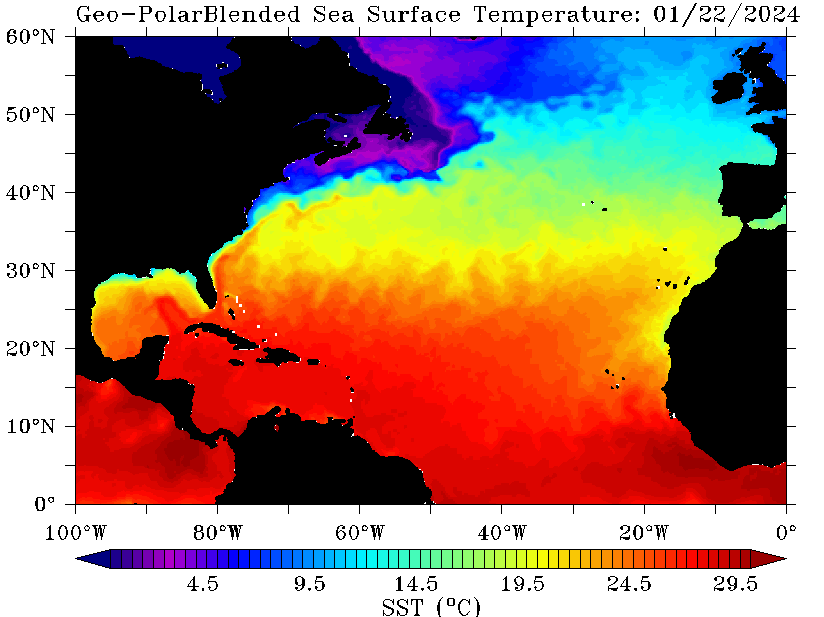 |
|
|
|
Post by acidohm on Jul 13, 2018 4:47:33 GMT
Something that's a bit of a first in the 4 years I've been observing N Atlantic ssta.
The lowest values are -5, the highest values are +4
So for the first time the negatives outweigh the positives..
|
|
|
|
Post by missouriboy on Jul 13, 2018 16:24:34 GMT
Something that's a bit of a first in the 4 years I've been observing N Atlantic ssta. The lowest values are -5, the highest values are +4 So for the first time the negatives outweigh the positives.. For anyone else out there that uses Photobucket. I can no longer get to my library for free uploads. It keeps sending me to a user rates/fees page. Has anyone else noticed a change? |
|
|
|
Post by Ratty on Jul 14, 2018 0:19:07 GMT
Something that's a bit of a first in the 4 years I've been observing N Atlantic ssta. The lowest values are -5, the highest values are +4 So for the first time the negatives outweigh the positives.. For anyone else out there that uses Photobucket. I can no longer get to my library for free uploads. It keeps sending me to a user rates/fees page. Has anyone else noticed a change? Sorry, I stopped using PB a few years back. I use Dropbox Basic for file storage/sharing (thanks Blue) and other software for image manipulation. PS: I recently upgraded my Alpha Female's laptop to an ACER and picked up 25Gb extra storage.  |
|
|
|
Post by acidohm on Jul 14, 2018 6:35:50 GMT
That sorts out another few years of baby expression images!! 🤣🤣
|
|
|
|
Post by missouriboy on Jul 23, 2018 19:23:49 GMT
Current Situation in the North Atlantic - SSTs and ARGO
SSts seem to show a sharp, definitive boundary between cold and warm along ~45 N and progressing eastward. Lab current still seems to be displacing(?) gyre northeastward flow along west Long. Warm water from south of Ireland to Bay of Biscay may be a remnant? West warm pool decreasing in size? 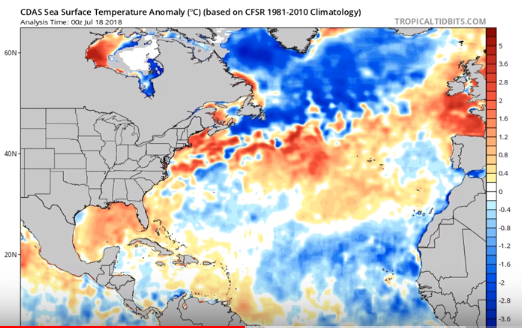 ARGO shows this spatial concentration of remaining warm water for June 2018 penned up across the Eastern N Atlantic with no positive anomalies reaching Europe and no warm reinforcements coming from the tropics. 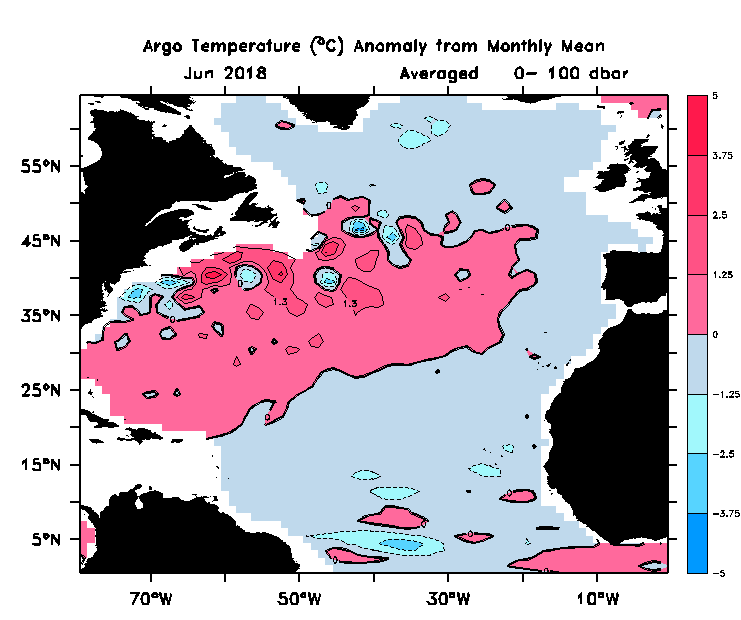 Cross-Longitude timeseries charts for 35-45 N latitude and 45-50 N latitude may tell a lot. Along 35-45 N note the above average anomalies across the entire basin since perhaps mid-2016, feeding out of the abnormally warm west. To me, this seems to indicate that the northern arm of the sub-tropical gyre is feeding more warm water directly eastward toward Spain (or parts further south) after being suppressed in the 2013-15 period. Along 45-55 N (that part which warms the Isles) some northward feed seems to have been re-established in 2017, but appears to be gone again in 2018. Not good news if it proceeds apace. The pre-2009 cushy times (in terms of northward heat transport) broke down during the last solar minimum and did not re-establish itself during Solar Cycle 24. Instead of being a relatively continuous northeastward flow, it has become sporadic pulses as the main warm flow proceeds more easterly. Whether the eddy is being pinched off by a stronger, colder flow over-powering a weaker gyre, or something else, it is apparent that something is afoot. 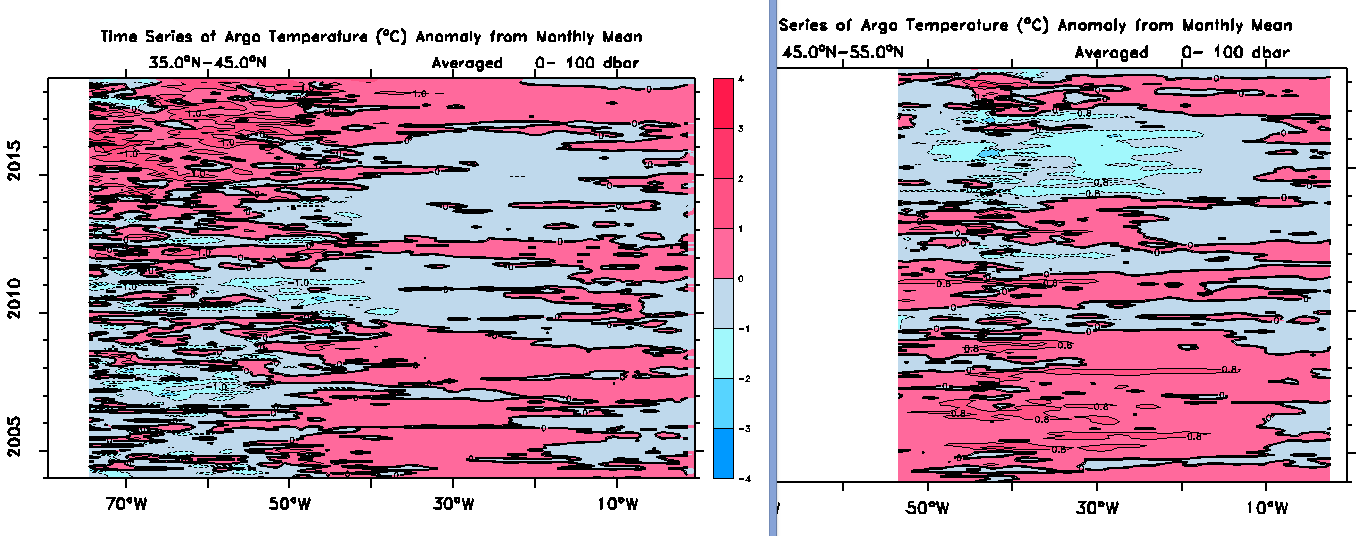 ARGO shows only a thin veneer of heat from 50-60 N and east of 40W and 2018 has gone negative. A long shot from the solid positive anomalies prior to 2011. 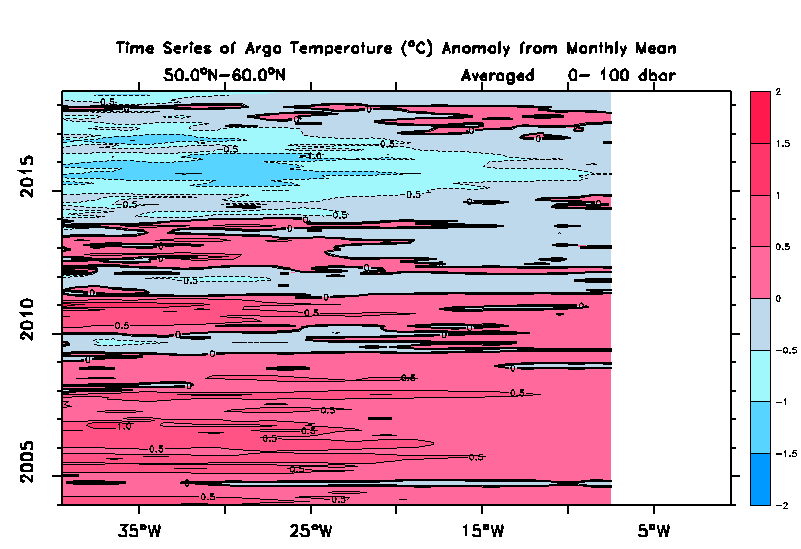
|
|